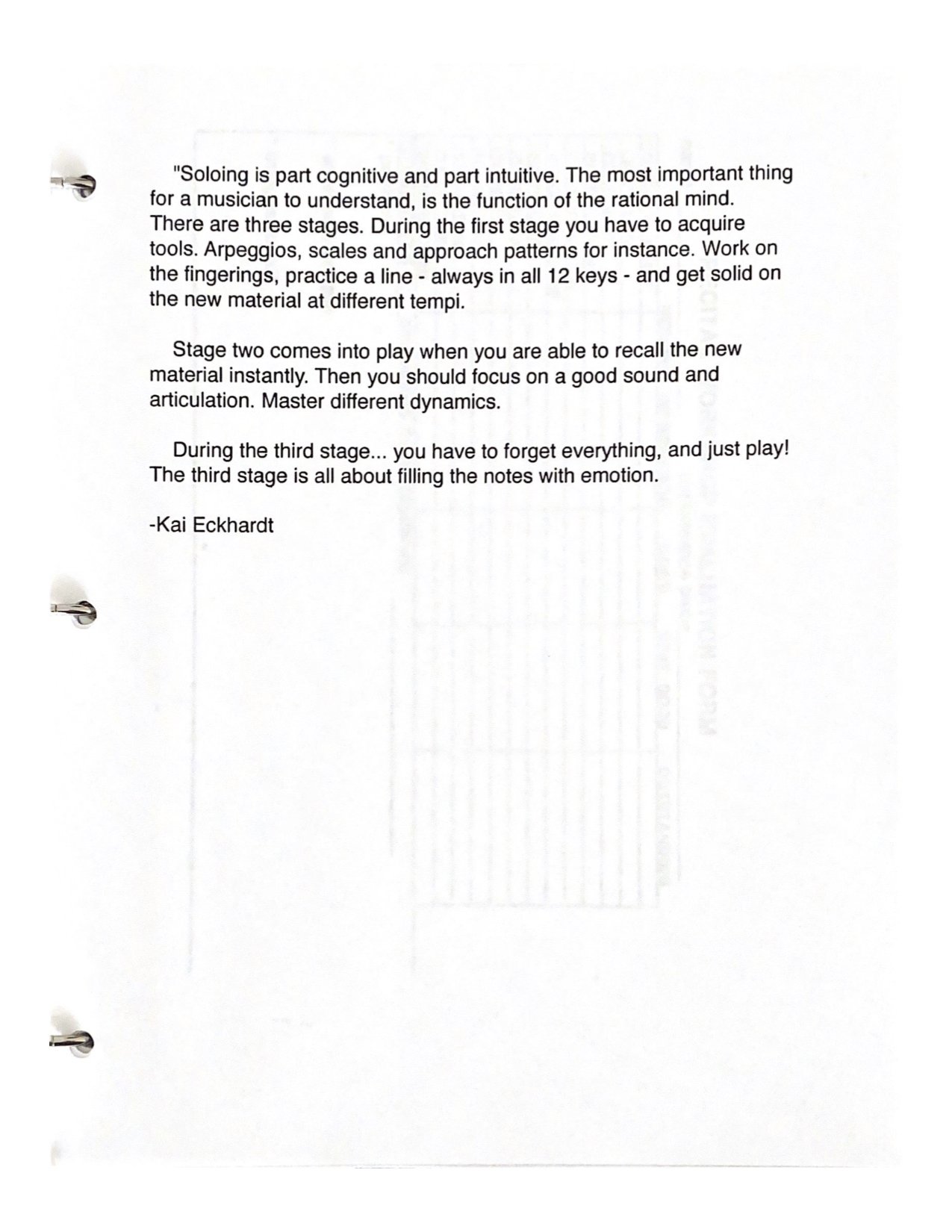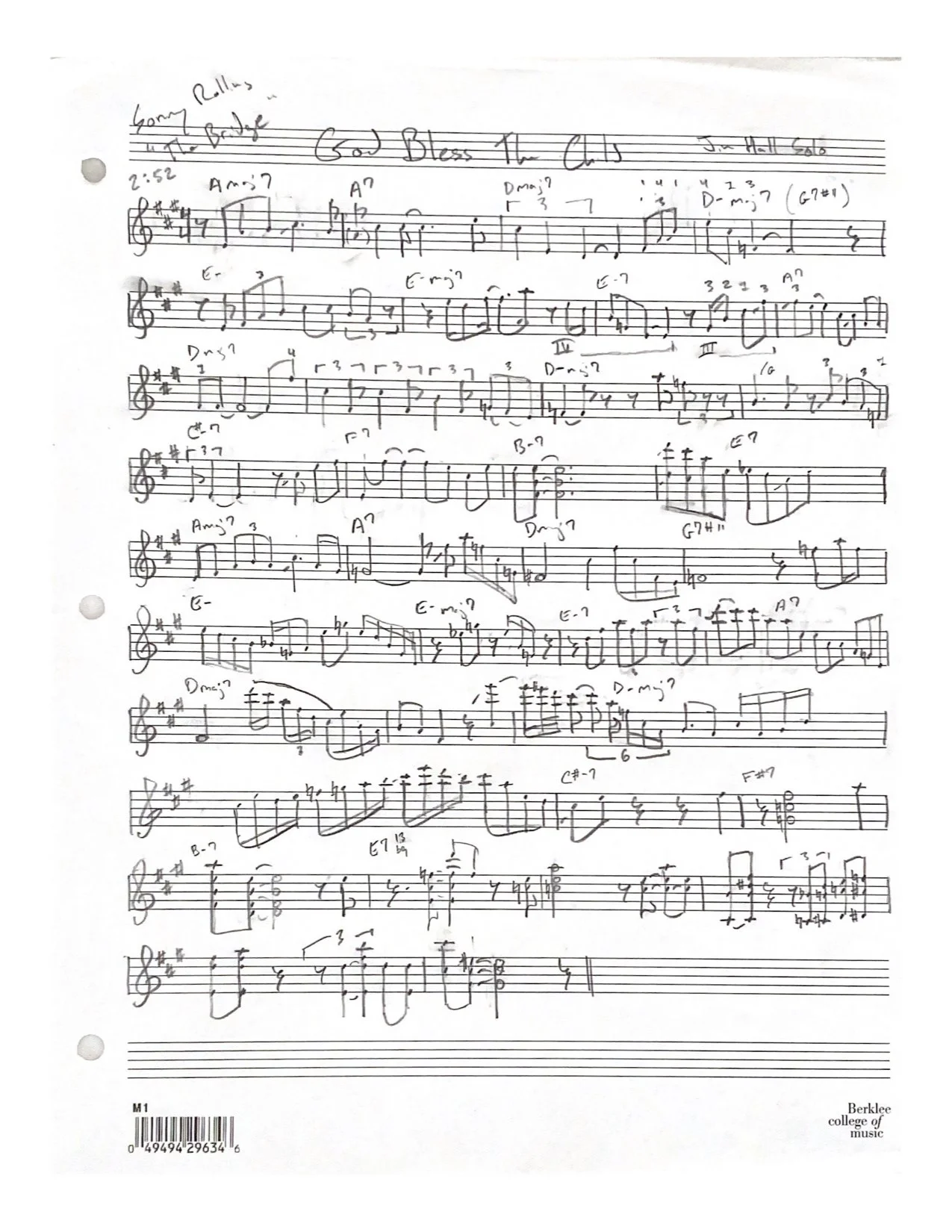
Inspiration
A selection of bits and pieces collected over the years
First, some videos.
Here’s Joe Henderson playing a duo version of “I Loves You Porgy” from a gig in 1998. John Scofield’s guitar complements him perfectly. Sound, time-feel, dynamics from both players are fantastic and the recording is completely unadorned - I love hearing the keys of the saxophone. Plenty of II-V-Is in this one incl applied dominants to all parts of the home key.
Here is Ben Monder playing Witchita Lineman, a classic Glen Campbell tune. What can I say other than this level of melodicism combined with scary technique is so rare.
Found this pdf of a Ben Monder practice framework on the internet at one point in time. Worth reviewing and seeing how much of this you can do…
Gary Burton’s 2 hr masterclass at Loyola is next. What a pro. He covers a ton of ground, with lucid explanations of the whole process of improvisation. Well worth the 2 hr investment.
One thing he said something that resonated with me (paraphrasing): you need to have a perspective on whatever tune you’re playing, something you want to show the audience.
How often are we just reading changes and going through the motions? Pick your tunes deliberately, and give the audience something new to think about!
Whitney Houston, 1991, wartime national anthem, 4/4 time, elegant reharmonizations. This is the GOAT anthem, arranged by John Clayton, himself one of the greats. There’s a very fluent, functional jazz vocabulary driving the harmony, but not one you typically ascribe to this tune, and it’s used to surprising emotional effect.
Some miscellany below for your enjoyment.
(Effusive) video from Charles Cornell breaking down the arrangement.
John C's FB post from early ‘21 on the backstory (copied below).
-
Whitney Houston’s Star Spangled Banner
Notes from the arranger--Me
Thank you, Friends. I mean that. I’ve been hearing about the groundswell of supportive comments, acknowledging my work and uplifting me. It’s time that I chime in and share with you some background re how the SSB arrangement came to be.
THE FIRST PART
A couple of months before the 1991 Super Bowl, Rickey Minor, my friend, fellow bassist and music director for Whitney Houston at the time, called me and said, “Hey, we’re going to do the national anthem at the Super Bowl. They’re giving us a symphony orchestra and we want you to do the arrangement.” It sounded exciting and fun, and I’d never done anything as widely viewed before. “Just 2 things—can you do it in 4/4 time instead of 3/4? Also, if you can set up some kind of groove in the orchestra percussion section.” I could do that.
The orchestra was in Tampa and there wasn’t enough in the budget to fly me from Los Angeles to witness and help at the rehearsal (Really? NFL? Not enough budget? Oh well). Rickey would go and be there for the rehearsal of my chart.
I waited all day to hear something. I had to go out that afternoon and when I came back, there was a message on my machine: “Uhm…Mr. Clayton, this is the Florida Symphony and we rehearsed your arrangement today. We have some, er…uhh…concerns. We’re actually considering using a more traditional arrangement of the piece. Could you please call us back?”
With eyes wide, I basically screamed “Noooooooooo!!!!!!”
I called Rickey.
“It’s cool. It sounds fine. They’re going to record it, I’ll work on them. Don’t worry.”
So, they did record it and all of the planets aligned and Whitney was amazing and, and, and…I grew up. Or, I was GROWN up by the experience.
THE SECOND PART
When I called the record label, after hearing our version would be released as a single, I wanted to discuss my royalty. Since it was a song in the public domain, I had copyrighted my arrangement. The person I spoke to at the label said he was “planning” to give me a call (yeah. sure) because they wanted me to sign away my royalty. The label would be donating royalties to the Gulf War effort. I thanked him and let him know that I would prefer to choose how I would donate my money and could you just please send me a normal royalties contract? His reply, “We’re not going to do that. And what can you do? Sue me? So, sue me.”
I reiterate, this experience GREW me up. I contacted an entertainment lawyer who was recommended by a friend and film writer. In the end (and I’m really shortening the story here), I decided to give them my royalty (insert your loud, unison “WHAT???!!!”). To further explain, I was a young man in my 30’s with 2 small kids, just found a house we could afford, and was I putting food on the table, gig by gig. Going up against a major label?—They would have kept me in court forever, swatted me around like an insect and sucked every drop of blood from me. Goodbye house, car, perhaps sanity.
In the end, I was/am fine. I missed out on some nice money. So what? I found other opportunities for money. I found more and more chances to write, play and record. I’m over it. My family is amazing. My kids are grown, happy and making a difference in the world. I let it go. No animosity, a huge life lesson learned, an enormous business lesson learned as well, and I’m good.
That includes whatever Rickey Minor did or didn’t say in the TV interview/program. I actually haven’t seen the pre-game program that didn’t give me any props. Sure; if I would have heard them, I would enjoy the nod. Ha!—My ego likes the strokes! Positive energy is good and I’ll take it.
So, thank you for sticking up for me. I appreciate it more than you can know! With what I’ve been through lately, here’s another example of you having my back. I'm flattered and grateful.
Was it Toni Morrison—Maya Angelou?—someone succinctly said what I feel (and I’m paraphrasing)
“The people who need awards, they should have them.”
When I heard that, it humbled me up real quick.
You’re awesome. Thanks for the blessing of your friendship.
Chord Etudes
The following are etudes based on concepts from Berklee’s Guitarmony class (some may even be my own homework). The idea with these is to play the specified chords above the staff with the specified melody note on top. These are substitutions for the standard chords in the staff. You’re generally supposed to voice these in drop 2.
These are not reharmonizations. You’re using substitute chords to generate nice sounding voicings that you can play in the context of the standard changes. Click for the full PDFs.
Thinking About Music
Transcriptions
It’s important to learn from the masters
Motet, Yellowjackets
Oleo, Relaxin' w/ Miles Davis Qtet
Pannonica, Kurt Rosenwinkel
Peace, Mark Turner
Tipper, Tony Rice
Leaving Again, Kurt Elling
God Bless the Child, Jim Hall
Forked Deer, David Grier
Remember, Hank Mobley (last page, lost the others...)
This I Dig of You, Mobley
Mobley, If I Should Lose You
Dig Dis - Mobley (just one page...)
Dewey Square - Rosenwinkel (2nd page)
Dewey Square - Rosenwinkel (page 1)
How Deep is the Ocean - Rosenwinkel
Stablemates - Coltrane
Practicing
A small selection of etudes, concepts, and other things I thought worth practicing.
Maj b6 Pentatonic applied to altered chords around the cycle.
7#11 Cadences - these gave (give) me fits. V7 of V7 or some variant of such, mostly in minor.
A Bret Willmott exercise. Play spread triads w/ melody note on top as specified.
Coltrane changes. Exploring the ways consecutive keys connect. E.g., b2 in old key becomes 4 in new key.
More Trane changes.
A Mick Goodrick exercise. One person plays top, the other plays bottom. Random trades of soloing and space.
Some bluegrass stuff I think?
Diminished ideas.
More diminished ideas, mapping out the triads on the fretboard.
Random thought on the straight diagonal "13#9 shape" - can it be inverted? Is that useful?
Open ended prompt to check out triad pairs and practice connecting them.
Voicings
How to play all those weird chords on guitar.
Lower right summarizes Herb Pomeroy's system for scoring "richness" of chord voicings. Gives you a framework to assess and control texture.
Garrison Fewell concept, playing notes on strings 6, 4, and 3. Part of the Jim Hall class. Check out that awesome voice leading for the first 8 bars of My Funny Valentine!
Tunes
Some stuff I’ve collected/written/arranged over the years. Includes some transcriptions/compositions by others as noted.


















































